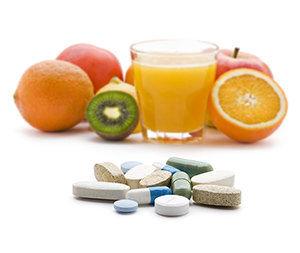Essential nutrients that you should consume every day during pregnancy
Vitamin A
Vitamin A boosts growth and the development of the bones, mucous membranes, skin, nails, hair and tooth enamel. It is essential to the development of the eyes, as it improves night vision and prevents certain diseases, such as cataracts, glaucoma, loss of vision and night blindness. It also prevents certain infectious diseases by stimulating antibody production and increasing the body's resistance to infection. It is an excellent natural antioxidant. Foods such as eggs, meat, milk and dairy products, liver and kidneys all contain vitamin A.
Vitamin B6
Vitamin B6 is another important vitamin for pregnancy, as insufficient intake can lead to anaemia. The recommended daily intake is 1.4 mg. It is found in meat, cereals and dried fruit.
Folic acid (vitamin B9)
Folic acid is one of the vitamins that play a key role in cell division. It is also involved in blood formation. It is found in green leafy vegetables, fruit, pulses, liver and wholegrain cereals.
Vitamin B12
Vitamin B12 is one of the vitamins that play a key role in cell division. Along with folic acid, it is involved in the synthesis of blood components. It works hand-in-hand with vitamin B9 or folic acid. The recommended daily intake is 2.5 µg. Vitamin B12 is found in meat, fish, milk and dairy products.
Vitamin C
Vitamin C boosts iron absorption, has antioxidant properties and is involved in gum and teeth formation. It is found in fruit and vegetables.
 Vitamine D
Vitamine D
Vitamin D is synthesised in the skin during sun exposure and is stored in the liver, brain, skin and bones.
It helps maintain normal levels of calcium and phosphorus in the blood. Calcium is essential to bone and teeth development, the transmission of nerve impulses and muscle contraction. Vitamin D plans a role in growth and cell development and boosts the immune system.
Vitamin E
Vitamin E, also known as tocopherol, acts primarily as an antioxidant: it keeps the cell membrane intact, helps the body heal and delays ageing. It also boosts immune system response by stimulating the production of defence cells.
Vitamin K
Vitamin K is involved in coagulation. It is stored in the liver and is involved in the synthesis of certain blood clotting factors. There are three different types of vitamin K: vitamin K1, which is found in food, such as green leafy vegetables; vitamin K2, which is synthesised by bacteria in the gut flora; and vitamin K3, which is the synthetic form used in dietary supplements. Vitamins K1 and K2 are sufficient to cover your daily needs.

